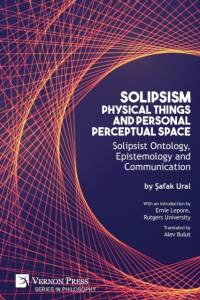Om Solipsism, Physical Things and Personal Perceptual Space
Solipsism indicates an epistemological position that denies the existence of 'others' by asserting that the 'self' is the only thing that can be known to exist. For sophist philosophers, the belief that "we can not know anything, and even if we do so, we cannot communicate it" is central to this theory.
However, until now there has been little academic scholarship that has tried to provide answers to the pressing issues raised by solipsism. In Solipsist Ontology: Physical Things and Personal Perceptual Space, Ural aims to redefine solipsism by analyzing and elaborating on traditional philosophical problems, such as empiricism and rationalism, as well as discussing problems of language, communication, and meaning. Ural reveals where solipsism has been previously ignored, pseudo-problems have arisen that disguise the sources of the problems with prejudices that concern the philosophical problems in question. Notably, many current, as well as traditional problems of ontology, epistemology, and language are bound up in discourses of solipsism.
Ural argues that discarding solipsism as a philosophical discourse hinders new interpretations of traditional philosophical thought. This book offers a fresh perspective to solipsism by defining it in relation to concepts such as 'physical things,' 'personal perceptual space' and 'identity.' Importantly, Ural proposes that an understanding of 'identity' is not necessary in order to redefine solipsism. By building a logical system that fashions communication and solipsism as interrelated, it is possible to reject 'identity' as a useless concept and thus overcome the classic solipsist dilemma of "we are not able to communicate."
This original piece of research is an important and timely contribution to the field of philosophy that will be of great interest to teachers, researchers, and students.
Visa mer

